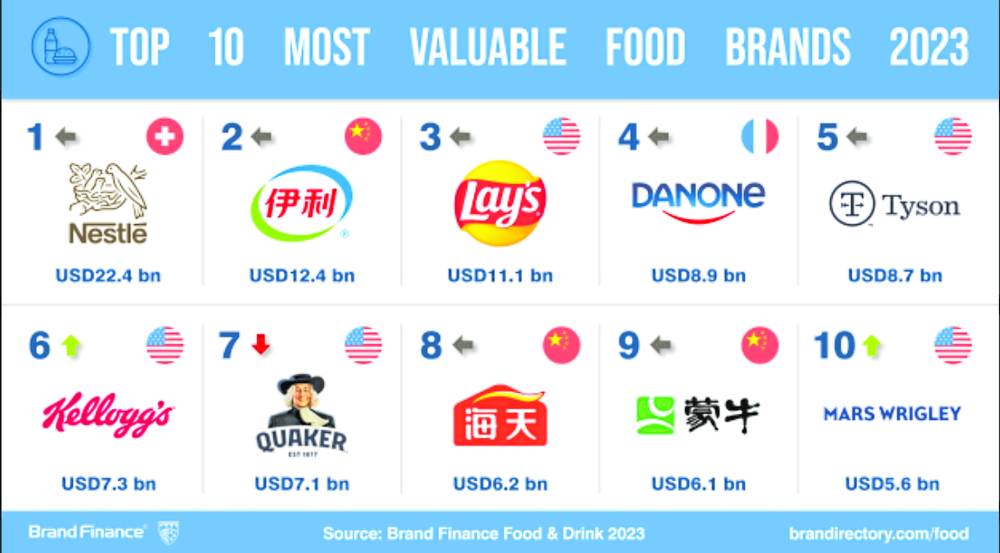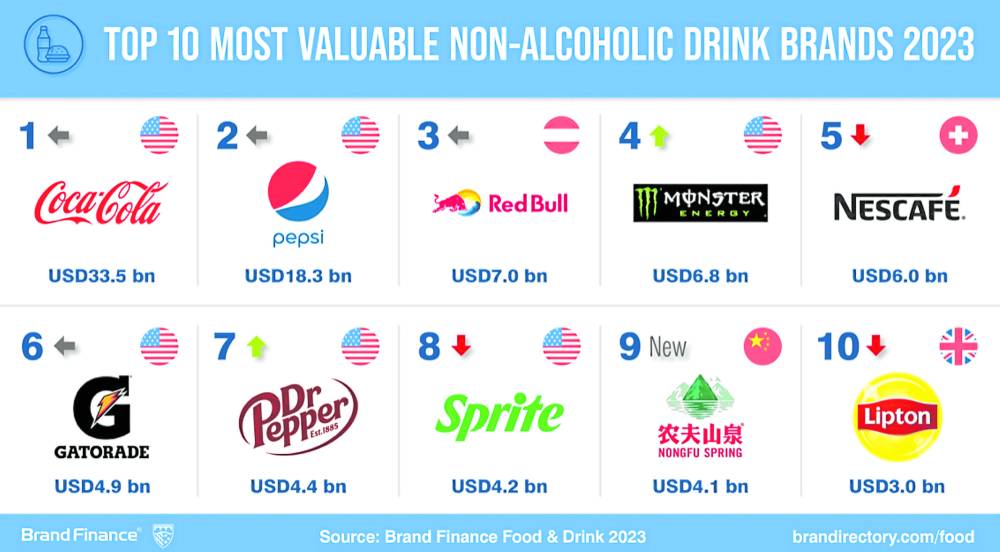The world’s most valuable food, beverage brands

HOUSEHOLD NAMES The brands that stand out. —BRAND FINANCE TABLES
What makes a brand valuable? What makes it stand out among the millions of food and beverage (F&B) brands battling for the consumer’s attention?
For 2023, Coca-Cola retained its top position as the world’s most valuable and strongest nonalcoholic beverage brand, based on the ranking made by Brand Finance, a leading global brand valuation consultancy. Valued at $33.5 billion, Coca-Cola continues to reign supreme, thanks to its global familiarity and reputation. For the food brand category, Brand Finance says Nestlé continued to savor success as the world’s most valuable brand. Its value went up by 8 percent to $22.4 billion and continues to steadily increase this year due to strong sales growth across its extensive and varied portfolio.
“With a rich history, iconic brand story and a steadfast dedication to customer experience and satisfaction, Coca-Cola has remained a global leader. The brand continues to boost its international reputation and capture the loyalty of generations across the globe through ingenious and powerful marketing campaigns, product evolutions and innovative digital strategies,” says Savio D’Souza, valuation director at Brand Finance.
As Coca-Cola sipped success in terms of valuation, it also cemented its position as the world’s strongest nonalcoholic drinks brand, with an AAA+ rating (extremely strong) and a Brand Strength Index score of 89.6 out of 100. Coca-Cola also has the highest Sustainability Perceptions Value (SPV) at $4.6 billion, thanks to its ambitious sustainability agenda. The brand aims to make 100 percent of its packaging recyclable globally by 2025 and use at least 50 percent recycled material by 2030.
Article continues after this advertisementHowever, Brand Finance cautions that “the brand’s position at the top of the SPV table is not an assessment of its overall sustainability performance, but rather indicates how much brand value it has tied up in sustainability perceptions.”
Article continues after this advertisementRed Bull (with a brand value of $7 billion), Monster ($6.8 billion) and Gatorade ($4.9 billion) also maintained their hold on the top 10 ranks amid the rise in energy drink consumption to fuel busy and active lifestyles after the pandemic.
Red Bull, which ranked as the third most valuable nonalcoholic drinks brand, also remained one of the world’s most recognizable drinks brands with its unique brand identity, catchy slogan and enormous global presence fueled by its various sporting endorsements.
Not to be outdone, caffeine-craving consumers made Nespresso the fastest-growing nonalcoholic drink. Nespresso, whose brand value soared 208 percent since the pandemic, is making its presence felt as more customers seek a more premium coffee experience at home.
“With its emphasis on quality and luxury, Nespresso became a popular choice. The brand has continued to boost its premium perceptions and global reputation with its innovative range of coffee machine and capsule offerings, as well as its sustainability initiatives,” the report says.
Top food brands
“As an iconic global brand, Nestlé continues to raise the bar, setting new benchmarks for the industry and inspiring trust among consumers worldwide. With a rich heritage and a portfolio of trusted brands, Nestlé has built a legacy of success and an unmatched global reputation, enhanced by its enduring dedication to creating a healthier and more sustainable future for all,” says D’Souza.
Nestlé recently expanded its plant-based portfolio with the introduction of a new milk alternative. The brand also launched its first-ever Nescafé Ice Roast coffee, designed to satisfy rising consumer demand for iced coffee at home.
The Swiss giant also has the highest SPV at $1.35 billion. According to the report, “[Nestlé’s] ongoing commitment to environmental and social responsibility, responsible sourcing and nutrition has contributed to its global perception as a sustainable company.”
Yii, a Chinese dairy brand, retained its position as the second most valuable food brand in the world. Its brand value of $12.4 billion is attributed to strong customer loyalty in its local market.
Snack brands also saw strong brand value growth. This year’s top five snack brands (Lay’s, Doritos, Want Want, Cheetos and Tostitos) increased their brand values by an average of 40 percent. A notable performer is Lay’s ($11.1 billion), which also retained third place position in the Food 100 ranking overall.
As the demand for healthy options continues to increase postpandemic, it is no surprise that Healthy Choice, a frozen food brand owned by ConAgra Foods, debuted into this year’s Food 100 ranking. Its brand value went up by 190 percent, or $1.2 billion this year. The increasing pressure to manufacture and promote more nutritious offerings, coupled with resilient demand for frozen foods, enormously benefited the brand.
Consumer’s sweet tooth did not disappoint. Hershey, the 125-year-old American confectionary giant, is still the strongest food brand with an AAA+rating. Also, Hershey scored 91 out of 100 in the brand strength index, an impressive feat despite increased inflation rates and supply chain disruptions.
In its annual ranking of brands from food and nonalcoholic drinks across all sectors and countries, BrandFinance gathered 5,000 of the world’s biggest brands, put them to the test and shortlisted the most valuable and strongest brands.
The methodology used by Brand Finance called royalty relief is defined as “the value a company would be willing to pay to license its brand as if it did not own it. This approach involves estimating the future revenue attributable to a brand and calculating a royalty rate that would be charged for the use of the brand.”
